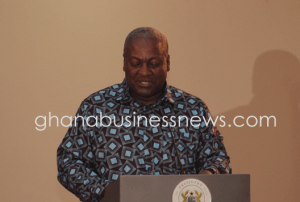Ghana launches National Migration Policy

Ghana has launched its National Migration Policy (NMP) to help manage its internal, intra-regional and international migration flows for poverty reduction and sustained national development.
The 154-page document was funded by the Government of Ghana in collaboration with the European Union, the International Organisation for Migration (IOM) and the United Kingdom Department of Foreign International Development.
President John Dramani Mahama in a speech read on his behalf at the launch in Accra by Mr Prosper D. K. Bani, Minister for the Interior, said the National Migration Policy represents a bold attempt by government to provide a comprehensive framework to manage migration for Ghana’s sustainable development.
He said the NMP had been formulated against the backdrop of several policy frameworks including the 1992 Constitution of Ghana and the Ghana Shared Growth and Development Agenda II (2014-2017).
The document is anchored within the context of the 2006 African Union Strategic Framework for Migration and the ECOWAS Common Approach on Migration.
“The drive to search for alternative sources of livelihood serves as a pull factor for the youth especially, to migrate through irregular means to engage in menial jobs in North Africa and Europe.”
“It is common knowledge that irregular migration has become a thorny issue which various countries are grappling with.”
“Irregular migration poses multiple challenges to countries of origin, transit and destination, as well as, to the migrants themselves,” President Mahama said.
He said reports from the Italian Ministry of Interior indicate that about 6,736 people have arrived in Italy since the beginning of this year.
He said in February, the Italian Navy and Coast Guards rescued more than 700 migrants from six boats off the coast of Libya, Morocco, Senegal and the Gambia; which serve as transit points, and later across the Mediterranean Sea to Europe and America without travelling documents.
“This situation is considered dangerous and quite often results in deaths, incarcerations and sometimes assassinations. This has a potential of having an adverse effect on the country’s economy,” he said.
He said the government has taken a keen interest in the area of migration management and holds the view that mainstreaming migration into development would be adequately achieved if there was a policy framework underpinning the processes.
“It is in the light of this, that the NMP document has been developed to address the existing gaps in the management of migration and the protection of the rights of all migrants in the country,” the President said.
“It is a comprehensive and integrated reference document which would provide a broad range of strategies on various migration related issues to guide policy makers and all other stakeholders,” he said.
He said a major policy objective was to promote and protect the interests, rights, security and welfare of citizens and migrants within and outside Ghana.
President Mahama announced that government would soon establish the Ghana National Commission on Migration, a body specifically mandated to manage migration and its related issues to provide interventions in line with the NMP.
He said government remains committed to the implementation of the policy and appealed to stakeholders to provide a collaborative support in ensuring that its benefits were promoted in order to minimize the cost of migration towards Ghana’s development.
Mr William Hanna, the Head of the European Union Delegation to Ghana, said migration was desirable when well managed. He pledged the European Union’s support to Ghana towards the full implementation of the NMP.
Sylvia Lopez-Ekra, the IOM Chief of Mission in Ghana, said in Ghana, migration had also been a central issue in 2015; stating that young men, at an increasingly young age, risked their lives in the desert and on unseaworthy vessels on the Mediterranean Sea to reach Europe.
She said at the same time, young women were increasingly entrusting their future to unscrupulous agents who lure them abroad with promises of well-paid domestic work.
“Last year we recorded exceptionally high numbers of arrivals with close to 4,500 Ghanaian arriving in Italy by sea,” she said.
Source: GNA
